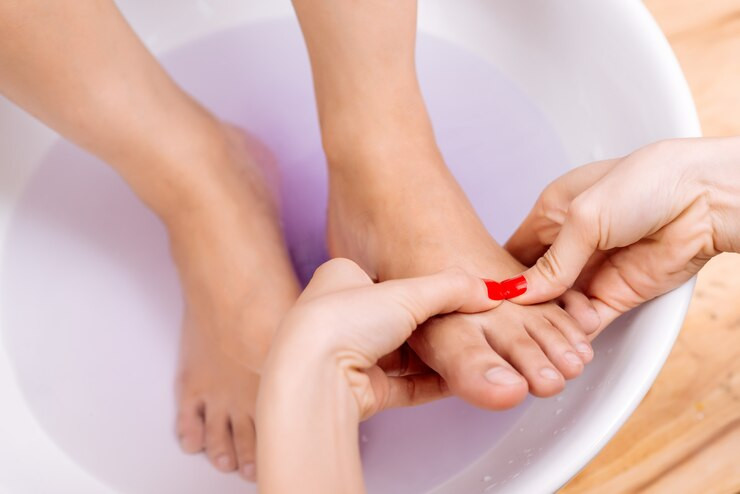Comprehensive Foot Care: Seasonal Tips for Summer, Winter, and Keeping Your Feet Healthy All Year.
Florence, United States - June 12, 2024 / Palmetto State Surgical Podiatry Associates /
Taking care of your feet is crucial no matter the time of year. Each season brings its own set of challenges that can impact the health and comfort of your feet. Whether you're dealing with the scorching heat of summer or the chilly winds of winter, knowing how to properly care for your feet can help you stay comfortable and prevent potential problems. Let's dive into some essential tips for foot care throughout the year.
Summer Foot Care: Embrace the Sunshine
Summer is a time for sandals, beaches, and outdoor fun, but it can also be tough on your feet. Here are some tips to keep your feet happy and healthy during the warmer months.
1. Keep Them Clean and Dry
Sweat and moisture can create a breeding ground for bacteria and fungi. Make sure to wash your feet daily with soap and water, and dry them thoroughly, especially between the toes.
2. Choose Breathable Footwear
Opt for shoes made of breathable materials like leather or mesh. Sandals and open-toed shoes can help keep your feet cool, but make sure they provide adequate support.
3. Protect Against Sunburn
Your feet can get sunburned just like any other part of your body. Apply sunscreen to the tops of your feet when you're wearing sandals or going barefoot.
4. Stay Hydrated
Drinking plenty of water helps keep your skin hydrated, including the skin on your feet. This can prevent dryness and cracking.
5. Watch Out for Blisters
Blisters are common in the summer due to increased activity and sweat. Wear moisture-wicking socks and properly fitting shoes to reduce the risk.
Autumn Foot Care: Transitioning Smoothly
As the weather cools down, it's important to adjust your foot care routine to meet the changing conditions.
1. Moisturize Regularly
Cooler weather can lead to dry skin. Use a good quality foot cream to keep your feet moisturized and prevent cracking.
2. Wear Appropriate Shoes
As you transition from sandals to closed shoes, make sure your shoes fit well and provide enough room for your toes to move freely.
3. Address Fungal Issues
The transition from warm to cooler weather can exacerbate fungal infections. Keep an eye out for any signs of athlete's foot or toenail fungus and treat them promptly.
4. Pedicures for Maintenance
Regular pedicures can help keep your feet looking and feeling good. Make sure to clean under your nails and keep them trimmed.
Winter Foot Care: Battling the Cold
Winter poses unique challenges for foot care, with cold temperatures and dry air being the primary concerns.
1. Keep Your Feet Warm and Dry
Wear warm, moisture-wicking socks to keep your feet dry and insulated against the cold. Wool or thermal socks are great options.
2. Moisturize More Frequently
The dry winter air can be harsh on your skin. Apply a thick, moisturizing foot cream daily to prevent dryness and cracking.
3. Avoid Long, Hot Showers
While it might be tempting to take long, hot showers in the winter, they can strip your skin of its natural oils. Opt for shorter showers with warm water instead.
4. Choose the Right Footwear
Invest in quality winter boots that provide insulation and keep your feet dry. Make sure they have a good grip to prevent slipping on icy surfaces.
5. Check for Circulation Issues
Cold weather can affect circulation, especially in the extremities. If you notice persistent coldness or numbness in your feet, consult a healthcare professional.
Spring Foot Care: Preparing for Warm Weather
Spring is a time of renewal and preparation for the warmer months ahead. Here’s how to get your feet ready.
1. Exfoliate Regularly
Shed the winter layers by exfoliating your feet regularly. This helps remove dead skin and keeps your feet smooth.
2. Gradually Transition Footwear
As the weather warms up, start transitioning to lighter footwear. Make sure to break in new shoes gradually to avoid blisters.
3. Continue Moisturizing
Spring can still be dry, so keep up with your moisturizing routine to maintain soft and healthy skin.
4. Pay Attention to Allergies
Spring allergies can sometimes affect your feet, especially if you're prone to skin reactions. Keep an eye out for any signs of dermatitis or other allergic reactions.
5. Get Active Safely
Spring is a great time to increase your activity levels. Make sure your feet are prepared for more movement by wearing supportive shoes and gradually increasing your activity.
General Foot Care Tips for All Seasons
No matter the season, some foot care practices are universally beneficial.
1. Regular Inspections
Check your feet regularly for any signs of problems, such as cuts, blisters, or changes in nail color.
2. Proper Nail Care
Keep your toenails trimmed straight across and not too short to avoid ingrown nails.
3. Wear the Right Shoes
Always choose footwear that fits well and provides adequate support. Avoid wearing the same pair of shoes every day to give them a chance to air out.
4. Maintain Good Hygiene
Wash your feet daily and change your socks regularly to prevent odor and infections.
5. Consult a Professional
If you experience persistent foot problems, don't hesitate to consult a podiatrist or healthcare professional for advice and treatment.
Conclusion
Taking care of your feet throughout the year requires some adjustments to your routine, but the effort is well worth it. By following these seasonal foot care tips, you can keep your feet healthy, comfortable, and ready for any activity. Remember, happy feet make for a happier you!
FAQs
1. How often should I moisturize my feet? You should moisturize your feet daily, especially during the winter and after washing them.
2. What should I do if I get a blister? Keep the blister clean and covered. Avoid popping it, as this can lead to infection. Let it heal naturally.
3. Can wearing the wrong shoes cause foot problems? Yes, wearing shoes that don't fit properly or provide enough support can lead to various foot issues, including blisters, bunions, and plantar fasciitis.
4. How can I prevent athlete's foot? Keep your feet clean and dry, and avoid walking barefoot in communal areas like locker rooms and swimming pools. Use antifungal powder if you're prone to infections.
5. When should I see a podiatrist? You should see a podiatrist if you experience persistent foot pain, notice any abnormalities, or have difficulty walking.

Contact Information:
Palmetto State Surgical Podiatry Associates
230 Cherokee Rd
Florence, SC 29501
United States
Misty Lee
(843) 773-6246
https://www.palmettostatepodiatry.com/
Original Source: https://www.palmettostatepodiatry.com/media-room/#/media-room

